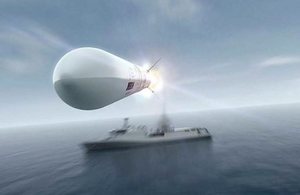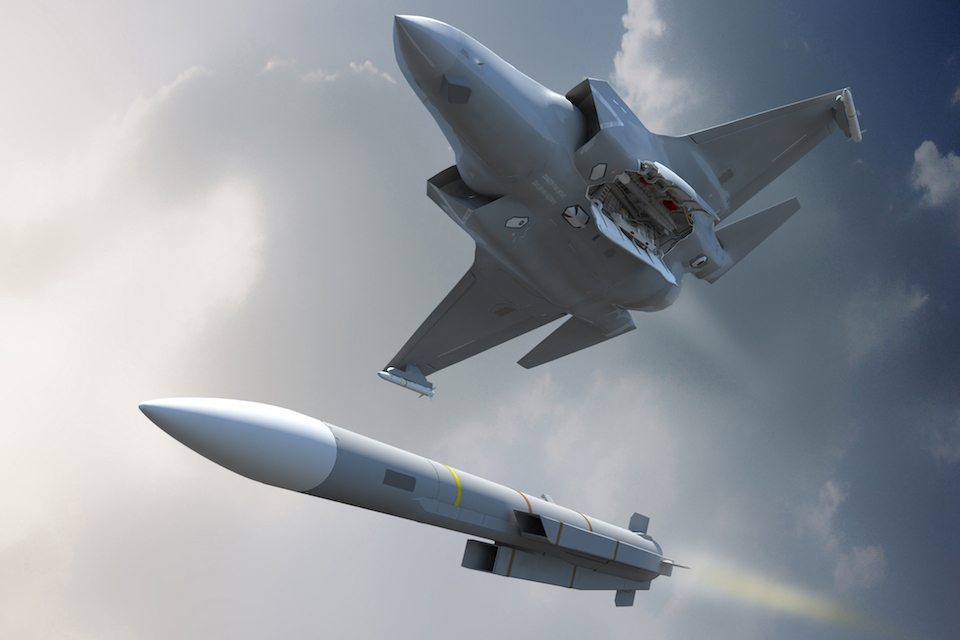Defence Secretary announces £539 million investment in new missiles systems
Secretary of State, Sir Michael Fallon, has today announced three new missile contracts worth a combined £539 million for state-of-the-art Meteor, Common Anti-air Modular Missile (CAMM) and Sea Viper missile systems at MBDA Stevenage.

CAMM in flight away from a Sea Ceptor armed ship. Image courtesy of MBDA Systems.
The deal ensures our Armed Forces have the best equipment available to protect the new Queen Elizabeth Class Carriers and the extended fleet from current and future threats.
The half a billion-pound contracts will sustain over 130 jobs with MBDA in the UK, with missile modification and service support being carried out in Stevenage, Henlow, Bristol and Bolton.
Secretary of State, Sir Michael Fallon, said:
This substantial investment in missile systems is vital in protecting our ships and planes from the most complex global threats as our Armed Forces keep the UK safe.
Backed by our rising Defence budget, these contracts will sustain high skilled jobs across the UK and demonstrate that strong defence and a strong economy go hand in hand.
As part of a £41 million contract, the Meteor air-to-air missiles will arm the UK’s F-35B Lightning II squadrons. It will provide the Royal Air Force and Royal Navy with a world beating missile that can engage with targets moving at huge speed and at a very long range. The weapon will enter service on Typhoon with the RAF in 2018 and the F-35B from 2024, and will be used on a range of missions including protecting the Queen Elizabeth Class Carriers.

Meteor missile fired from a fighter jet. Image courtesy of MBDA Systems.
Meanwhile, a £175 million in-service support contract for the anti-air Sea Viper weapon system will ensure that the Royal Navy’s Type 45 Destroyers can continue to provide unparalleled protection from air attack to the extended fleet. Under the contract, the missiles will be maintained, repaired and overhauled as and when required to ensure continued capability. The Sea Viper missile defends ships against multiple threats, including missiles and fighter aircraft.
The final contract is a £323 million deal to purchase the next batch of cutting-edge air defence missiles for the British Army and Royal Navy, offering increased capability at a lower cost. Designed and manufactured by MBDA UK at sites in Bolton, Stevenage and Henlow, the next-generation CAMM missile will provide the Armed Forces with missiles for use on sea and on land. CAMM has the capability to defend against anti-ship cruise missiles, aircraft and other highly sophisticated threats. Signalling our continued investment in Type 26 programme, CAMM will provide the anti-air defence capability on the new Type 26 Frigates for the Royal Navy and will also form part of the Sea Ceptor weapon system on the Type 23 Frigate and will also enhance the British Army’s Ground Based Air Defence capability by replacing the in-service Rapier system.
Tony Douglas, Chief Executive Officer of Defence Equipment and Support, the MOD’s procurement organisation, said:
Work on these cutting-edge missiles, which will help to protect the UK at home and abroad and secure jobs across the country, demonstrates the importance of Defence investment. That is why, working closely with our industry partners, we continue to drive innovation and value into everything we do; securing next generation equipment for our Armed Forces at the best possible value for the taxpayer.
Dave Armstrong, Managing Director of MBDA UK, added:
MBDA is delighted by the continued trust placed in us by the Ministry of Defence and the British military. The contracts announced today for Meteor, CAMM and Sea Viper will help protect all three UK Armed Services, providing them with new cutting-edge capabilities and ensuring their current systems remain relevant for the future. They will also help to secure hundreds of high-skilled people at MBDA UK and in the UK supply chain, maintaining the UK’s manufacturing base and providing us with a platform for exports.